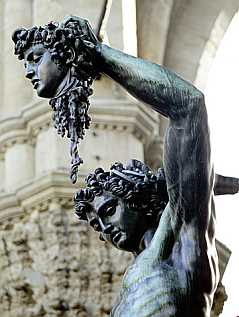 Last week, I proposed ten common myths about Christianity after watching a marathon of the TV show Mythbusters on Christmas Day. I floated the myths to you readers to see what you thought about them, and also asked how they might be scientifically labeled as busted, plausible, or confirmed.
Last week, I proposed ten common myths about Christianity after watching a marathon of the TV show Mythbusters on Christmas Day. I floated the myths to you readers to see what you thought about them, and also asked how they might be scientifically labeled as busted, plausible, or confirmed.
The Ten Myths:
- Christians are more judgmental than non-Christians.
- Christians are stingier than non-Christians.
- Christians are more intolerant of other people than non-Christians.
- Christians are more short-sighted than non-Christians.
- Christians don't know how to have fun.
- Christians despise intellectuals more than non-Christians do.
- Christians prefer kitsch over important art.
- Christian subculture mimics the world rather than creating anything lasting.
- Companies run by Christians are as unethical as secular companies, and perhaps more so.
- Christianity causes more problems in the world than any other religion.
I wish I could say that I have the same kind of rigorous scientific data to correctly analyze those myths, but I can't. Like the mythbusters in the show, the best I can come up with is my own personal experience after encountering those myths in my own Christian walk of 30 years. I've personally tested some of those myths in my own life, or I've watched them play out in other people's. Whatever I come up with here will therefore not necessarily apply everywhere. In other words, Your Mileage May Vary.
Onto the first few myths…
1. Christians are more judgmental than non-Christians
Though the old show All in the Family is rapidly fading from public consciousness, Archie Bunker lives on in the lives of plenty of people. If there's one thing that can be said about Americans, it's that we have an opinion on everything—and we aren't afraid to let others know it.
Both non-Christians and Christians have their share of Archie Bunkers who compartmentalize everything in life and assign an opinion. The Blogosphere provides a window into the American judgmental mentality as one blog after another (including this one) waxes poetic about the meaning behind everything from commercials for diapers to politics.
Judgments fill the air.
On the whole, though, we Christians can't escape being judgmental. In the end, we're far more judgmental than non-Christians if for no other reason than the Bible commands us to be so:
Beloved, do not believe every spirit, but test the spirits to see whether they are from God, for many false prophets have gone out into the world.
—1 John 4:1 ESV
Now our definition of what constitutes a "spirit" might vary, but if we believe that ideas have spiritual forces (both good and evil) behind them, then a true Christian worldview demands that we constantly judge. Non-Christians can follow the spirit of the age, but we're called to make judgments that keep us off the broad road that leads to destruction.
But what of this?
"Judge not, that you be not judged. For with the judgment you pronounce you will be judged, and with the measure you use it will be measured to you."
—Matthew 7:1-2 ESV
The problem for us comes when we fail to discern the difference between ideas and people. The Lord doesn't ask that we judge people. He alone judges people because only He can correctly judge someone's heart. We're to test spirits. We accept or reject spirits, not people.
Christianity in America can't seem to understand this distinction. This leads us to a bunker mentality at odds with our Lord, the One who ate with prostitutes and tax collectors
In that way, our judging comes back to haunt us. I suspect that one of the main reasons the Church in the United States is so critically unproductive concerns our inability to judge correctly, even though we're hyperactive about labeling and judging others. The outstretched arm we use to keep "evil" at bay also holds others back from knowing Christ.
So yes, Christians are supposed to be more judgmental than non-Christians. Our problem is the way in which we judge and our judging people rather than spirits. It is one thing to make godly decisions, but quite another to be a Christian Archie Bunker.
Assessment: Plausible.
***
2. Christians are stingier than non-Christians
A new book entitled Who Really Cares by Arthur C. Brooks tackles the liberal/conservative battle over charitable giving. Brooks details the reality that while liberals talk about helping others, conservatives actually do it. At least they show they do it by the amount of money they give to the less privileged.
Who Really Cares postulates that those people who truly give tend to possess at least three of four distinctives: a religious devotion, strong families, personal entrepreneurship, and a skepticism about the government's role in economic life. Those traits seem to come right out of Focus on the Family's promotional material, but they underscore the author's point.
What then to make of the perpetual grousing from wait staff at restaurants that Christians are the worst tippers? A few blogs jumped on the fact that wait staff bemoaned the cheapness of attendees at a recent Southern Baptist Convention conference. I had lunch with a pastor a few months ago and he asked our waiter what his least favorite time to work was. "Sunday" was the answer. And I'm sure you know why.
Our generosity—or lack of it—says much about the state of our souls. In too many Christian circles, I believe the prevailing verse might be
The poor you always have with you….
—John 12:8a ESV
That verse becomes an excuse not to help. We gave our ten percent at church, so don't ask anymore of us because, hey, the poor will always be there. In some circles we also hear that the poor deserve to be poor because they're out of God's will (or they're right in God's will and God is simply punishing them right now) or that they simply have not put strategic biblical principles in play to seed wealth and prosperity.
If anything, the call to genuine Christianity entails this:
And all who believed were together and had all things in common. And they were selling their possessions and belongings and distributing the proceeds to all, as any had need.
—Acts 2:44-45 ESV
Does anyone see this actively practiced in most Christian churches in America? I certainly have seen little of that kind of practice on the whole, though I've encountered a smattering of families who truly believe to that level of commitment. On the whole, though, our American mindset of wealth accumulation trumps that Acts passage.
So while Arthur Brooks's study may be true, it's sadly not true enough. The bar the Lord set for giving outstrips our timid attempts, proving us far stingier than we're called to be.
In the end, whether Christians outgive non-Christians isn't really the issue, but whether Christians are giving as much as they should be. In that regard, we're falling down on the job.
Assessment: Wrong question.
***
3. Christians are more intolerant of other people than non-Christians.
This issue parallels #1 since judging people leads to shunning them.
It's hard not to think that we Christians today lead sanitized lives. Certain Evangelicals, in particular, are prone to erecting the kind of suburban Camelots where keeping that "one brief shining moment" from brevity demands one's attention 24/7/365. One day, that kind of idolatry may very well have a name. (I'm lobbying for "Osteenism" for its apt similarity to Onanism.)
Should we be surprised then that messy people bother us? We like our sinners converted and with a side of Prada. Nevermind some hooker who smells like the confluence of a twenty-year-old bottle of Charlie and the back booth of an adult bookstore. We'll erect a ministry to take care of her and man it with new college grads, their idealism still intact. But invite her into Camelot? Puhleeze!
Maybe it's not so much that we're intolerant, but that we've trumped the rest of Scripture with this one verse:
Do not be deceived: "Bad company ruins good morals."
—1 Corinthians 15:33 ESV
Yes, if we go alone into the world of filth, we may be compromised. But if we bring the lost into a community of faith, that's entirely different.
Our inability to accomplish this simple task reflects in the American Church's poor showing in evangelism. By all accounts, the church in this country is not growing. As pollster George Barna notes, 9/11 did nothing to swell our ranks. We're still asleep in the light.
What does this have to do with intolerance? Nothing is more intolerant than letting someone pass into a Christ-less eternity. Yet the knowledge that eternal damnation greets those whose name is nowhere to be found in the Book of Life no longer distracts us from preserving our little Camelots.
"Intolerant" doesn't mean that we have to actively crusade against some evil group or another to win that label. What it does mean, though, is that we simply don't care enough to see beyond some group's perceived evil to the real lost souls behind it.
So while non-Christians may not tolerate others, their intolerance comes to nothing. It simply doesn't matter.
On the other hand, our intolerance means people wind up in a lake of fire without end.
Last month, I quoted the following from Leonard Ravenhill's classic Why Revival Tarries, but it fits here again:
Charlie Peace was a criminal. Laws of God or man curbed him not. Finally the law caught up with him, and he was condemned to death. On the fatal morning in Armley Jail, Leeds, England, he was taken on the death-walk. Before him went the prison chaplain, routinely and sleepily reading some Bible verses. The criminal touched the preacher and asked what he was reading. "The Consolations of Religion," was the replay. Charlie Peace was shocked at the way he professionally read about hell. Could a man be so unmoved under the very shadow of the scaffold as to lead a fellow-human there and yet, dry-eyed, read of a pit that has no bottom into which this fellow must fall? Could this preacher believe the words that there is an eternal fire that never consumes its victims, and yet slide over the phrase with a tremor? Is a man human at all who can say with no tears, "You will be eternally dying and yet never know the relief that death brings"? All this was too much for Charlie Peace. So he preached. Listen to his on-the-eve-of-hell sermon:
"Sir," addressing the preacher, "if I believed what you and the church of God say that you believe, even if England were covered with broken glass from coast to coast, I would walk over it, if need be, on hands and knees and think it worthwhile living, just to save one soul from an eternal hell like that!
It's all how you look at it. And from where I sit today, I don't see us doing much about it.
Assessment: Confirmed, in far too many cases.
***
Stay tuned the rest of this week for more assessments of supposed myths about Christianity.
Entries in this series:
{Image: Perseus with the Head of Medusa by Benvenuto Cellini}


 Over the last week, we've been looking at commonly heard statements about Christianity that have taken on mythical proportions. It's hard to be a Christian in the West and not encounter these myths:
Over the last week, we've been looking at commonly heard statements about Christianity that have taken on mythical proportions. It's hard to be a Christian in the West and not encounter these myths:  Last week, I
Last week, I